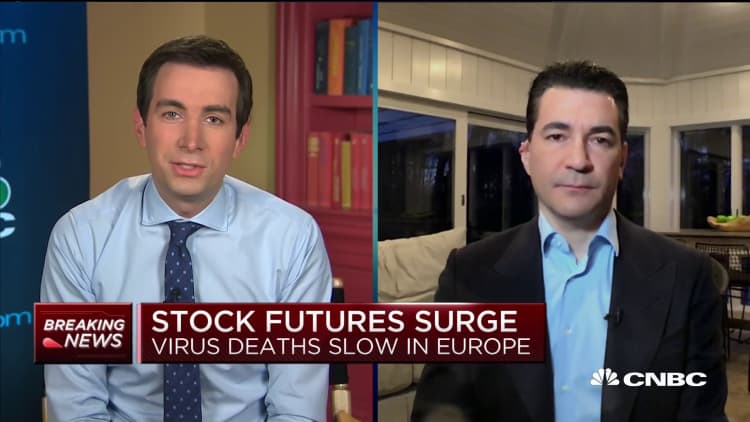The head of surgery at one of New York's top hospitals likened the coming weeks of the COVID-19 outbreak to war, saying doctors were about to fight "our Gettysburg, our Somme, our Iwo Jima, our Khe Sanh, our Fallujah."
New York–Presbyterian Hospital/Columbia University Irving Medical Center in Manhattan is on the front lines of the coronavirus epidemic in New York City. The rousing memos to staff from Dr. Craig Smith, the hospital's surgeon in chief, have been shared widely as an onslaught of COVID-19 patients pour into the hospital.
Officials and epidemiologists tracking the spread of the virus warn that this week could be among the most deadly yet in New York City. The virus has infected more than 67,551 people in the city and killed at least 3,048 people, according to Johns Hopkins University.
"We yearn to find our invincible spring, but we are hurtling into weeks predicted to be our worst," he said in a memo sent to staff Sunday, comparing the weeks ahead to decisive battles of American wars. "The steadily positive slope we've watched for a month is grinding and relentless."
City and New York state officials have warned for weeks that the rapidly growing number of infections in New York City threatens to overwhelm the local health system when hospitalizations peak, which Gov. Andrew Cuomo said is expected this week.
The U.S. Army Corps of Engineers has converted the Jacob K. Javits Convention Center and other facilities in the city into temporary hospitals to boost the capacity to treat patients. The state has struggled to increase its supply of medical equipment, including masks, gowns and ventilators, a potentially lifesaving device that helps patients breathe. Now, the city is looking to increase its number of medical workers as doctors and nurses like those at New York–Presbyterian face weeks of relentless work.
The mortality rate across New York state now stands at 2.9%, Smith wrote to staff, adding that it's too early to compare how New York hospitals have fared next to other hard-hit cities.
"I do know that right now we are waist-deep in execution, in the fog of war," he wrote. "We are preoccupied with patients presenting to our hospital—a high-risk group. The heroic efforts I witness every day are second to none. Many more lives are being saved than lost. Let the referees count the strokes at the end of the round."
The University of Washington's Institute for Health Metrics and Evaluation is producing models for each state's rate of infection that the White House has previously referenced. The university's models, as of Monday morning, predict that New York state will reach peak resource use on Wednesday, April 8.
That model predicts New York state will fall short by roughly 12,400 hospital beds of what will be demanded and fall nearly 6,000 intensive care beds short. The model estimates that up to 15,618 people could die in New York due to COVID-19 by Aug. 4.
However, the spread of the virus is showing signs of slowing in New York and some other areas even as the rate of death accelerates, former Food and Drug Administration Commissioner Scott Gottlieb told CNBC on Monday.
"The Pacific Northwest and New York are improving. They're showing signs of hitting their peak probably this week," said Gottlieb, a CNBC contributor who sits on the boards of Pfizer and biotech company Illumina. "The South and the Southeast, however, are probably heating up. This is going to be a tough week."
"This is a fiercesome pathogen," he said on "Squawk Box." "This is right up there with some of the most firecesome contagious diseases we've dealt with."



